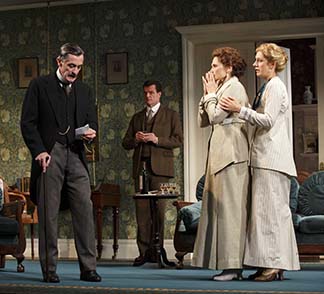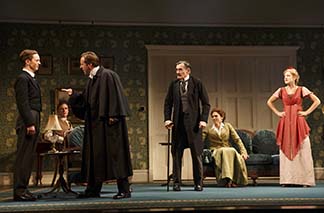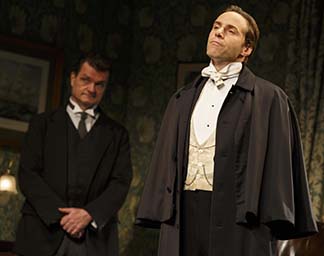By Lucy Komisar
Terrence Rattigan‘s “The Winslow Boy” is a British period piece that is still eminently satisfying. Written in 1946 and set in 1912 to 14, it is based on a true story.

A father in an upper class household – at least upper class enough to afford a full-time servant – gets a letter informing him that his son has been accused of purloining a five-pound postal order from another boy at the Royal Naval College. He believes the son that the accusation is unjust and must immediately make a moral choice that could risk the family‘s financial status.
This Old Vic production, directed by Lindsay Posner, is smart and gripping and not at all creaky. In fact it reminds one of the Shaw plays of the time. That owes a lot to the strong performances of the tough sinewy Roger Rees as the boy‘s father, Arthur, Charlotte Parry as his daughter, the feminist charmer, Catherine, and to others in a superb cast. Rattigan was, like Shaw, ahead of his times in writing admirable feminist characters.
The scene is the Winslows‘ sitting room. There is a green couch with throw pillows, green floral wallpaper and double doors to the dining room. In a corner is a victrola, which will play jazzy music of the era. It‘s comfortable, but not too elegant.
As befits the times and the family‘s station, while son Ronnie (Spencer David Milford) is at the naval college, son Dickie (Zachary Booth) is at Oxford. Catherine, who is by far smarter than her brothers, is a volunteer at the women‘s suffrage association. Point clearly made.

Although pressing the case to overturn the judgment against the boy threatens to provoke a public scandal, which Victorian families eschewed, Arthur refuses to accept Ronnie taking the fall for another‘s peccadillo.
Though his wife Grace (the very purposeful Mary Elizabeth Mastrantonio) opposes his stance, because it is eating into the family fortune, he insists on hiring the best lawyer in the country to fight the case.
The barrister, Sir Robert Morton (Alessandro Nivola), a member of parliament, is personally conservative but also committed to uphold justice. You get some of the play-by-play of the off-stage courtroom, where Morton uses his wits to challenge the key witnesses. Nivola makes the fellow a bit mysterious; you don‘t quite know what makes him tick.
Catherine is strong and supportive of pressing the case, even though this jeopardizes her impending marriage to the weak-minded and somewhat patronizing John Watherstone (Chandler Williams), who is concerned at the scandal‘s effect on the allowance he gets from his conservative father. (We immediately conclude that she is better off without him.)
They are all rather stock characters, including Desmond Curry (the comic Michael Cumpsty), a slightly maladroit fellow who is mad about Catherine.

Neither of the Winslow boys seems to have much inner strength, or at least maturity. Ronnie goes to the movies during a crucial moment in the case, and Dickie is a lackadaisical fellow who is devoted to his own amusement. (As a fellow without much substance or work ethic, he is deemed not worth the tuition at Oxford and will be sent to work at a bank. I don‘t think Rattigan knew how prescient that was!)
Posner‘s direction keeps the play current and on the mark about the moral conflict between money and principles.
Morton is attracted to Catherine though he‘s a sexist who denigrates the fight for women‘s rights. At the conclusion, when he tells her, “Goodbye, Miss Winslow. Shall I see you in the House then, one day?” She replies, “Yes, Sir Robert. One day. But not in the Gallery. Across the floor.”
Well said!
“The Winslow Boy.” Written by Terence Rattigan; directed by Lindsay Posner. The Old Vic at the Roundabout Theatre Company, 227 West 42nd Street, New York City. 212-719-1300. Opened Oct 17, 2013; closes Dec 1, 2013. 10/26/13. Review on New York Theatre-Wire.


Is this a metaphor for the movie V for Vendetta. Which is a superb explanation of the possible method which was used to change the ideology of some of britain’s parliamentary laws? There should be a broadway show made of this movie because of the difficulty it would represent to have screen such as the seen at the end of the movie.
Hurray for Cold War movies and broadway shows that depicts the desperate methods of the opponents to get a victory!